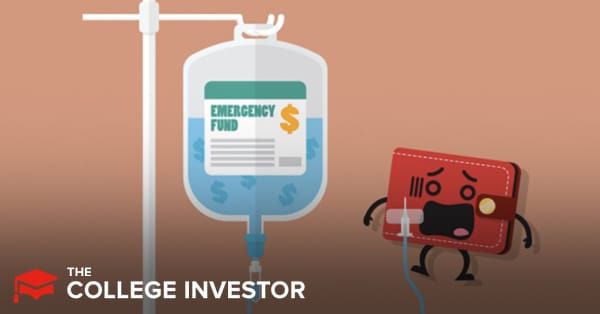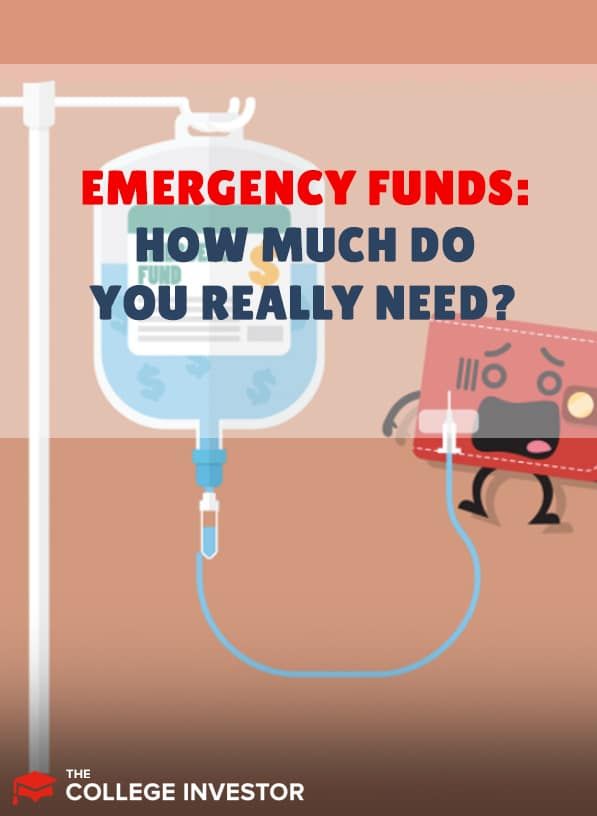
Let's talk about emergency funds... or...
Freedom Fund.
The "Oops" Account.
A "Rainy Day" Fund.
The "$h-t Hit the Fan" Account.
However you refer to it, having an emergency fund is critical to anyone's long-term financial well-being. In a pinch, an emergency fund is a safety net that can help you avoid taking on unnecessary debt, help you weather a financial crisis, and assist you with getting back on your feet after a myriad of unexpected curve balls are thrown your way.
What Is An Emergency Fund?
An emergency fund is simply cash you've set aside to cover an unexpected expense. When thinking about your money, you have your "normal" income and expenses. This could include your rent or mortgage, utilities, car payment, insurance, groceries, and more.
But what happens when your car needs a new transmission? Or a pipe bursts in your house? Or you suddenly find yourself out of work?
That's where an emergency fund comes into play. It's cash you have on hand to pay for these expenses so you don't go into debt (or more debt), or even worse, you simply can't pay and have to deal with furthermore issues.
How Much Do You Really Need?
For many, the answer to this question is found via the recommendations of people who are deemed to be financial "experts." However, contrary to what you may think, a quick survey of that expert financial advice may not give you a concrete solution. In fact, it may very well confuse you to the point of giving up your quest to fund an "EF" adequately. After all, when you're faced with multiple options, it's sometimes difficult to make a definitive choice....
"Save six months of expenses"
"Save one year of expenses based on your bare-bones budget"
"Save $1,000 in a baby EF"
These options are all examples of expert advice that is shared daily. With all of the options out there, how are you supposed to decide which method to adhere to?
The key to navigating the waters successfully is to remember that setting up, funding, and utilizing an EF is a personal decision. No matter what any expert touts as the best method for establishing an emergency fund, you need to tailor your approach to your own personal situation. Remember, personal finance is personal.
So whether it's that you save one month, six months, or twelve months of expenses, the point is that you're saving something. This is especially true if you're just starting out on your own:
Save something; anything.
How To Build It
As you begin to build your emergency fund by saving anything you can, the following tips are worth remembering:
- Fund the account regularly. One of the most critical components of an emergency fund is the actual funding of the account. It needs to be automatic, as in something that you'll do each and every week, month, or year. If you're struggling to pay your bills or meet your obligations now, just think of how beneficial a bit of breathing room could be. Even if it's only $25/month, something is always better than nothing in this case. Look for the best online checking accounts to get an account with good rates and fees.
- Over-estimate what you think you'll need. One caveat to funding EFs is that people often miscalculate just how much they'll need. If you're going to base your account balance on a certain amount of monthly expenses, you should build in a bit of a buffer to help you navigate the inevitable visits you'll receive from Murphy.
- Utilize separate accounts. An emergency fund should not be held in the same day-to-day checking account you use daily. It also shouldn't be lumped in with long-term goal savings such as a house down-payment fund or future college tuition funds for your children.
- Tailor your approach to your specific situation. Once you've found a plan that sounds best for you, don't forget to ensure it's suited for your particular needs. Base your projections upon factors such as how many income streams you/your family has, medical needs, childcare costs, etc.
- Remember that EFs are fluid. Above all, remember that much like life's circumstances, your emergency fund's balance may always be changing. You might be required to spend some of its funds, but you should also work to replace said funds once you've recovered from whatever setback or challenge necessitated the use of the money. By treating your EF as a fluid entity, you're one step closer to maintaining financial freedom.
Where Do You Put It?
Once you've built it, you should keep your emergency fund in a high yield savings account or money market account to work for you. You could also consider looking at CD accounts, but that does tie your money up a bit.
Why these types of accounts and not just your checking account (or money under a mattress)?
Because when you have money just sitting and waiting to be used, you want to earn interest on it. Having money in a savings account or money market account earns you passive income through interest. It might not be a lot of money, but it's free money for doing nothing with your emergency fund money!
Alternatives (Use At Your Own Risk)
Let's talk about some alternatives to accessing cash in an emergency. While a savings account is king (because cash is king), there are other options to consider. These do carry pros and cons, though, and only should be used by certain individuals.
When thinking about an emergency fund, you want the following:
- It must be cash or cash equivalent (i.e. no gold, artwork, etc.)
- It must be relatively liquid (i.e. you need the funds in 3 days or less)
- It must be safe - in many cases, you need cash when the stock market or economy is in turmoil, and if you don't have "safe" assets, what you thought was $100 actually ends up being $50
- You should be able to add or reduce the account as needed, relatively easily
Credit Cards
Credit cards are one of the more popular alternatives to an emergency fund, especially for people who have no debt, pay them off in full every month, and utilize them for points. If you have a great rewards credit card, you could earn substantial cash back for using it as an emergency fund.
And some credit cards, like American Express Platinum, have no preset spending limit for qualified individuals so you can spend what you need.
The big cons are high interest on any balance you may carry, as well as the very low risk you could see your card closed when you need it most. In fact, during the early days of the Covid-19 emergency, Chase and American Express closes thousands of accounts and reduced balances on even more accounts. They did this to reduce their own risk. If you were a user, you could be in trouble if you needed to use your card.
Pros: Easy access, can be used to pay virtually anywhere.
Cons: High interest, potential for closure.
Home Equity (HELOC)
If you own a home, tapping into your equity is seen by many as a potential emergency fund. This is especially true if the emergency involves home repair.
While using your home as an emergency fund sounds enticing - low rates, you can use a debit card, and more - it also comes with risks.
The first risk is simply you're going to pay interest on it, and if you don't pay, you could lose your home. But with interest rates on mortgages at near all-time-lows, this is pretty minimal.
The bigger risk, in my opinion, is that in a true financial crisis when you might need to access the money, your bank could freeze your HELOC and prevent you from using it. Banks are allowed to do this to limit their risk, and if they think that your house value has declined, the simply freeze you from spending your HELOC. This was done in the last housing crisis in 2008-2010.
Pros: Large amount available, low interest rates on HELOCs
Cons: Tied to your home, potential to be frozen.
Portfolio Line Of Credit
If you have a large portfolio in a taxable account, you can tap into that money with a portfolio line of credit. This is how many investors access their cash without having to sell investments.
Rather than sell your stocks and have to pay capital gains taxes, savvy investors simply use a portfolio line of credit to get a loan at a low interest rate. Many brokerage firms allow you to borrow anywhere from 35% to 50% of the value of your portfolio, at low rates from 3.5% to 8%.
This is an attractive alternative if you have a sizable portfolio. The risk is that if your portfolio value drops, you could be subject to a margin call - where the brokerage will demand you repay some (or all) of your loan, or else they will sell your assets to repay the loan. In a financial crisis, when stocks fall, this could be a bad situation.
Pros: Low cost access to capital, avoid capital gains taxes
Cons: Subject to margin call if asset prices fall
Final Thoughts
Having an emergency fund, especially when you're starting out on your personal finance journey, is essential. Even as you get a little wealth, it's a useful tool for navigating the inevitable "unexpected" expenses that you'll encounter.
If you have a significant portfolio, it could seem worth it to try an alternative to cash in a savings account, but at the end of the day, "cash is king" and even though you might have cash "not being productive", peace of mind is usually worth more than any marginal return you might receive.
What is your benchmark for how much you keep in your emergency fund?

Robert Farrington is America’s Millennial Money Expert® and America’s Student Loan Debt Expert™, and the founder of The College Investor, a personal finance site dedicated to helping millennials escape student loan debt to start investing and building wealth for the future. You can learn more about him on the About Page or on his personal site RobertFarrington.com.
He regularly writes about investing, student loan debt, and general personal finance topics geared toward anyone wanting to earn more, get out of debt, and start building wealth for the future.
He has been quoted in major publications, including the New York Times, Wall Street Journal, Washington Post, ABC, NBC, Today, and more. He is also a regular contributor to Forbes.
Editor: Clint Proctor Reviewed by: Chris Muller
